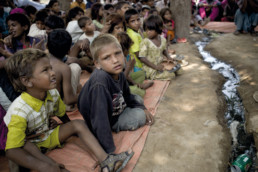Research published in The Lancet Global Health led by City’s Professor Corinna Hawkes and members of the World Health Organization warns that the world is facing a “double burden of malnutrition”.
Professor Hawkes, Professor of Food Policy and Director of the Centre for Food Policy at City, is part of several international initiatives on nutrition and food systems and was recently appointed as Vice-Chair of the London Child Obesity Taskforce by London Mayor Sadiq Khan.
The report takes a two-pronged approach to global nutrition challenges, with both malnutrition and obesity given equal weight regarding the pressing issues these conditions present to millions of people worldwide and what steps need to be taken to reduce them.
Malnutrition has many forms. Undernutrition can cause children to be dangerously thin for their height (wasting), or to have their growth permanently impeded (stunting). Conversely, diets rich in calories well beyond the body’s metabolic needs drive the burden of overweight and obesity, while excess dietary fat, sugar and salt can increase the risks of
non-communicable diseases (NCDs).

There are also biological connections between the different forms of malnutrition – for example, a stunted child is more likely than a child of normal height to be overweight or affected by NCDs as an adult.
Professor Hawkes said: “Most countries are doing well, most countries are not on target for reducing stunting or wasting. And there isn’t a single country that is doing well enough at reducing anaemia and micronutrient deficiencies, nor are there any countries doing well at reducing overweight and obesity.
“We estimate that around one third of the global population is experiencing some form of malnutrition. We also found that there is inadequate action. Around 62 per cent of countries do not have any policies in place designed to encourage healthier diets. And only 15 per cent of children in lower middle-income countries are achieving an adequate diet; so there’s a lot of work to be done.”
The research recommends that countries put into place ‘SMART’ targets, policies and objectives, i.e., those which are Specific, Measurable, Attributable, Relevant and Time-bound. Such measures will then hold those countries significantly more accountable. “That is our number one recommendation and we call on countries, businesses and NGOs to do so,” said Professor Hawkes.